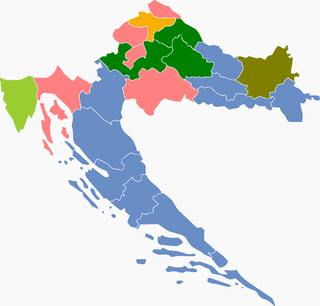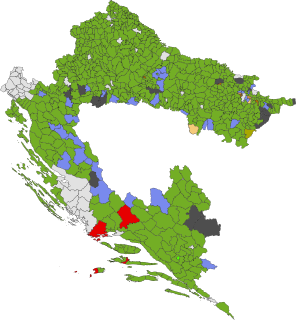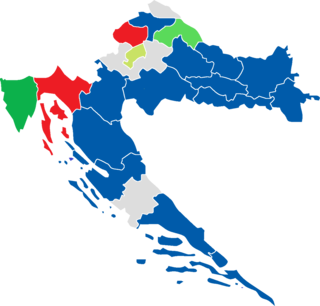The politics of Croatia are defined by a parliamentary, representative democratic republic framework, where the Prime Minister of Croatia is the head of government in a multi-party system. Executive power is exercised by the Government and the President of Croatia. Legislative power is vested in the Croatian Parliament. The Judiciary is independent of the executive and the legislature. The parliament adopted the current Constitution of Croatia on 22 December 1990 and decided to declare independence from Yugoslavia on 25 May 1991. The Constitutional Decision on the Sovereignty and Independence of the Republic of Croatia came into effect on 8 October 1991. The constitution has since been amended several times. The first modern parties in the country developed in the middle of the 19th century, and their agenda and appeal changed, reflecting major social changes, such as the breakup of Austria-Hungary, the Kingdom of Serbs, Croats and Slovenes, dictatorship and social upheavals in the kingdom, World War II, the establishment of Communist rule and the breakup of the SFR Yugoslavia.
Regular elections in Croatia are mandated by the Constitution and legislation enacted by Parliament. The presidency, Parliament, county prefects and assemblies, city and town mayors, and city and municipal councils are all elective offices. Since 1990, seven presidential elections have been held. During the same period, ten parliamentary elections were also held. In addition, there were nine nationwide local elections. Croatia has also held three elections to elect members of the European Parliament following its accession to the EU on 1 July 2013.
Elections in Hungary are held at two levels: general elections to elect the members of the National Assembly and local elections to elect local authorities. European Parliament elections are also held every 5 years.

Parliamentary elections were held alongside the presidential elections in Croatia on 2 August 1992, the first after independence and under the new constitution. All 138 seats in the Chamber of Representatives were up for election. The result was a victory for the Croatian Democratic Union, which won an absolute majority of 85 seats. Voter turnout was 75.6%.

The Head of Kyiv City, unofficially and more commonly the Mayor of Kyiv, is elected by popular vote city official who serves as a head of the Kyiv city state administration and a chairperson the Kyiv City Council.

The 2009 Croatian local elections were held on 17 May, with the second round held on 31 May where necessary.

The 2012 Italian local elections were held on 6–7 May, with a second round on 20–21 May. In Italy, direct elections were held in 948 municipalities: in each municipality (comune) were chosen mayor and members of the City Council. Of the 948 municipalities, 28 were provincial capitals and only 176 had a population higher than 15,000 inhabitants.

The 2013 Croatian local elections were held on 19 May, with the second round held on 2 June where necessary.

Presidential elections were held in Croatia on 22 December 2019. As no candidate received a majority of all votes, a second round took place on 5 January 2020 between the two candidates with the highest number of votes in the first round. They were the seventh presidential elections since the first direct ones were held in 1992.

Valter Flego is a Croatian politician who has been a Member of the European Parliament for Croatia since 2 July 2019. Previously he had served as the 4th prefect of Istria County from 2013 to 2019, as well as he served three terms as mayor of the town of Buzet. He is a member of the liberal Istrian Democratic Assembly (IDS) party.

The 1940 Croatian local elections were held in 625 municipalities of the Banovina of Croatia on 19 May 1940, and in 33 municipalities on 26 May and 2 June. These were the first elections following the Cvetković–Maček Agreement and the establishment of the autonomous Croatian Banate within the Kingdom of Yugoslavia. The elections were not held in cities and some Adriatic counties bordering, or adjacent to, Italy. Only men older than 24 were allowed to vote. Voting was public and conducted by voice.

The 2017 Zagreb local elections were held on 21 May and 4 June 2017 for the Mayor of Zagreb and members of the Zagreb Assembly. Milan Bandić, the 52nd and incumbent mayor since 2005, ran for a sixth 4-year term. As no candidate won an absolute majority of the vote in the first round, a second round of elections took place on 4 June 2017 between the two highest-placed candidates in terms of popular vote: incumbent mayor Milan Bandić of the Bandić Milan 365 - Labour and Solidarity Party and former Minister of Construction Anka Mrak Taritaš of the Croatian People's Party - Liberal Democrats. In the run-off Bandić won re-election as mayor, taking 51.8% of the votes against 46% for Mrak Taritaš. Turnout for the election was 47.7% in the first round and 41.2% in the second round.
Centre is a liberal political party in Croatia. The party was formed under the name Pametno in Split in 2015 out of the citizens' initiative Za pametne ljude i pametan grad. The fundamental values endorsed by the party are the promotion of democracy, accountable and transparent management of public resources, civil proactive protection of fundamental human rights, economic development and environmental protection.

The first round of the 2017 Croatian local elections was held on 21 May and the second round, where necessary, on 4 June. All seats of the county prefects, city and municipal mayors and members of county, municipal and city councils were up for election.
The 2017 Split local elections were held on 21 May and 4 June 2017 for the Mayor of Split and members of the Split city council. Ivo Baldasar, the 71st mayor who served from 2013 to 2017 ran for re-election to a second four-year term, ultimately finishing in 9th place with 0.80% of the vote in the first round. As no candidate won an absolute majority of the vote in the first round, a second round of elections was held on 4 June 2017 between the two highest-ranked candidates in terms of popular vote: Željko Kerum of the Croatian Civic Party, who was previously the 70th Mayor of Split from 2009 to 2013, and Andro Krstulović Opara of the Croatian Democratic Union. Krstulović Opara narrowly won the run-off taking 46.2% of the votes against 44.3% for Kerum. Turnout was 45.5% in the first round and 38.1% in the second round.

Vojko Obersnel is a Croatian politician who served as Mayor of Rijeka from 2000 to 2021.
This local electoral calendar for 2021 lists the subnational elections that were and are scheduled to be held in 2021. Referendums, recall and retention elections, and national by-elections are also included. Specific dates are given where these are known.

The 2021 Zagreb local elections were the elections for the 53rd mayor of Zagreb, the two deputy mayors, the 47 members of the Zagreb Assembly, the councils of districts and the local committees. It was part of the Croatian local elections, which took place on 16 May 2021. The runoff for the mayor took place on 30 May 2021.

The first round of the 2021 Croatian local elections were held on 16 May and the second round, where necessary, on 30 May. All seats of the county prefects, city and municipal mayors and members of county, municipal and city councils were up for election.

The 2021 Rijeka local elections were the elections for the 15th mayor of Rijeka, the two deputy mayors and the 31 members of the Rijeka City Council. It is was a part of the Croatian local elections, which were held on 16 May 2021. The incumbent mayor, Vojko Obersnel of the Social Democratic Party (SDP), announced on 6 November 2020 that he would be retiring at the end of his sixth consecutive term in office. The first round saw Marko Filipović (30.25%) and Davor Štimac (16.10%). Filipović is defending the "long-time stronghold" of the SDP against independent centre-right candidate Štimac.
















